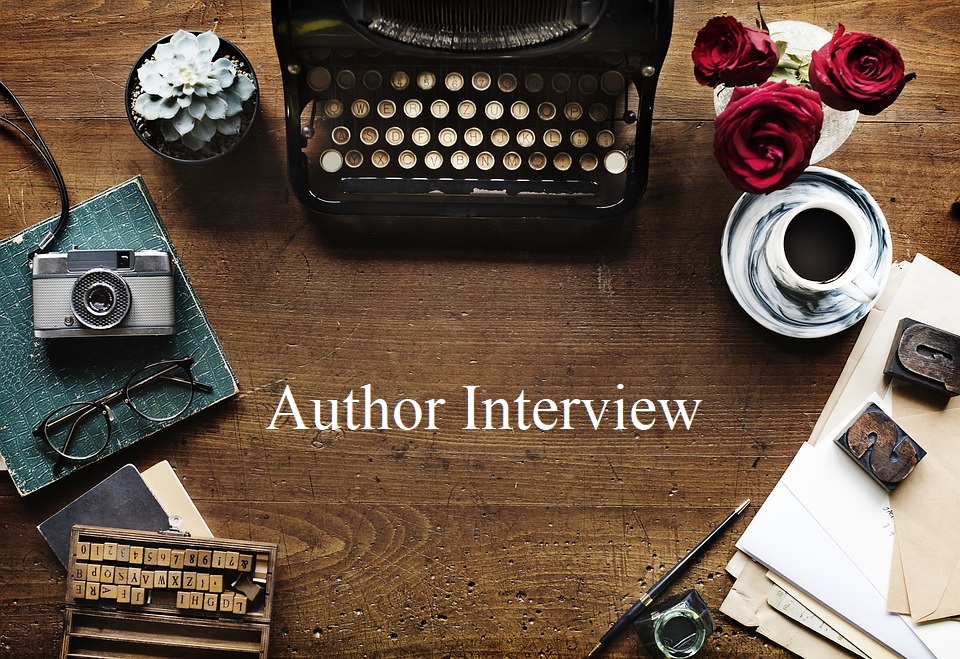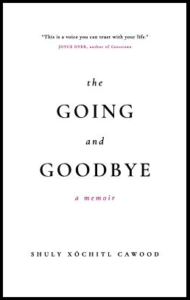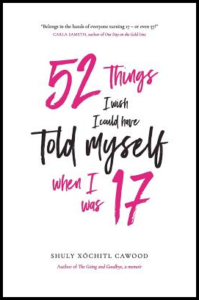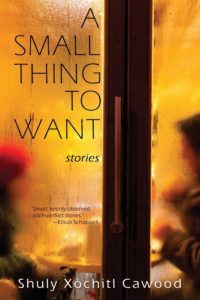An Interview with Shuly Xóchitl Cawood
 Writing communities are vital to the health and well-being of an author and their works. One of the most robust writing communities lives here in the Dayton area: the friends, supporters, attendees, and faculty of the Antioch Writers’ Workshop. Shuly Xóchitl Cawood has been a part of that workshop, as attendee, speaker, and supporter. And that’s where I initially “met” Shuly. Since that time, I’ve gotten to know her and her work a little better, and I’m awed by her honesty and rawness. She’s the author of The Going and Goodbye and 52 Things I Wish I Could Have Told Myself When I Was 17. Her newest work, A Small Thing to Want released last week, and the forthcoming poetry collection, Trouble Can Be So Beautiful at the Beginning, will publish in 2021. She also writes for the Community Voices section of the Johnson City Press. Another busy author? Absolutely. And so I’m thankful that she reserved some time for answering my questions.
Writing communities are vital to the health and well-being of an author and their works. One of the most robust writing communities lives here in the Dayton area: the friends, supporters, attendees, and faculty of the Antioch Writers’ Workshop. Shuly Xóchitl Cawood has been a part of that workshop, as attendee, speaker, and supporter. And that’s where I initially “met” Shuly. Since that time, I’ve gotten to know her and her work a little better, and I’m awed by her honesty and rawness. She’s the author of The Going and Goodbye and 52 Things I Wish I Could Have Told Myself When I Was 17. Her newest work, A Small Thing to Want released last week, and the forthcoming poetry collection, Trouble Can Be So Beautiful at the Beginning, will publish in 2021. She also writes for the Community Voices section of the Johnson City Press. Another busy author? Absolutely. And so I’m thankful that she reserved some time for answering my questions.
Christina: You’ve been writing stories for a long time: your first stories emerged on your father’s blue Selectric typewriter. Time has changed, obviously, and so has technology. Have your stories changed too? Or have you always written about certain themes?
Shuly: My first fictional stories were about a family, and the two main characters were always these sisters, Claudia and Irene. Their biggest adventure was going to Kmart. I hope my short stories have evolved since then, but I still write about love and relationships—sisters, families, partners, friends, exes. I’m that person who eavesdrops on conversations in public spaces—checkout lines, sporting events—and who watches the body language of couples at restaurants to determine if it’s their first date or their third or their hundredth or their last. I’m that person who can immediately imagine their backstory.
I especially like writing about the small but powerful events that shape us, and I am always interested in how we make choices about the people we choose to love and the people from whom we choose to walk away.
Christina: That’s the perfect segue into this next question. One theme you’ve written about is loss and letting go. What’s the greatest lesson you’ve learned about letting go?
Shuly: Not to fight it so hard. I have tried keeping people in my life who weren’t meant to be kept. It took me decades to realize that if someone was trying to leave, to let them.
Christina: You write columns, poetry, full-length memoir, and more. Does one genre appeal to you the most? Do you think your voice stands out in one genre more than the others?
Shuly: I love all of them equally but for different reasons. I’ve been writing poetry the longest consistently, so it’s familiar, like putting on a well-worn, comforting sweater. It’s the genre I often go back to when I am stuck. I love fiction because it’s the most challenging and because my characters surprise me all the time. It’s fun not to see something coming that ends up making perfect sense. I love memoir because I studied it so much that it comes easy now, and it’s definitely the genre I feel most skilled in when it comes to critiquing other people’s work or teaching.
I used to think my voice only stood out in memoir, but now that I have been focused on writing fiction for years, my voice has become clear in that genre. It took a while. For a long time (longer than I liked), I was just at the See-Spot-Run stage, trying to get characters from point A to point B. Now when I write stories, my voice comes through. I didn’t send my short story collection to publishers until I had plenty of those stories.
Christina: In a post your wrote for Kate H. Rademacher’s Risky Love blog series, you say: “I vowed to never lose again the thing I had lost for years and found that one shiny night: trust in myself, belief in my ability to remain intact, to move on. Belief in who I had always been, but forgotten.” Many people, women especially, lose that belief easily. What can you suggest to those who might still be looking to find that trust?
Shuly: In my little advice book, 52 Things I Wish I Could Have Told Myself When I was 17, I write, “Trust your body to tell you—via insomnia, indigestion, the inability to sit still—when something is wrong.” I really believe that. Our bodies never lie.
Once, many years ago, sometime after my divorce, I experienced a breakup that crushed me. I spent weeks and then months reeling from it. The man and I—who lived many miles from each other—had quite a few differences we couldn’t work out, but at the bottom of it all, we loved each other. Still, after the breakup, we played a game of chase—I being the chaser who just wanted to meet up and talk about things, and his being the fleer who would say yes, let’s do that, and who would then cancel. Months later, he showed up on my doorstep one early Sunday morning and said he wanted to get back together, and we could figure out all our differences. It was the thing I had wanted for months and months, and I let myself enjoy that one glorious day together, basking in his presence and love. “We can even get married next week if you want,” he said, and while I was not ready for that, I loved how bold he was in his commitment—it felt like no matter what obstacle, surely we would overcome it.
That evening, after he left, I fell asleep with hope, thinking that maybe we could do this.
That night, I woke up around 2 a.m.—I was startled from sleep. The first thing that popped into my head (or, really, that woke me) was a sentence he had said during our day together—a sentence I had obviously heard but not paid any attention to, had subconsciously ignored. My body wasn’t going to let me ignore it anymore. He had said, “If I knew you weren’t going to change your mind about X, I wouldn’t want to marry you.” X was one of our differences. X was a thing about me that was in fact never going to change.
I went, Oh.
It was the clarity I needed to finally listen to what my body knew all along, and to move on.
Christina: I love the title of your newest work: A Small Thing to Want. So many times, we convince ourselves that what we want is small, and therefore, it’s not really important. How do we undo that practice of listening to ourselves without becoming self-absorbed?
Shuly: I think rather than worrying about being too self-absorbed, I was the person who worried about taking up too much space, who worried about not wanting to ask for something that was more than what I “should” be asking for. Tricky word, that “should.” I’ve had to learn to allow people the space to give more, to say yes when people offer things, especially emotionally, and to voice my needs. I’m a work in progress.
Christina: Writers always tell other writers to set some sort of writing routine. Do you have a set routine? What does a typical day look like for you?
Shuly: I’m not the writer to emulate when it comes to this. I do not have a set routine. I write most days, but sometimes it’s blogging, sometimes it’s writing for work—it’s not always producing fiction or poetry. I can be hard on myself when I don’t get to that at some point in the day. Sometimes the business aspects of writing (blogging, researching literary magazines or publishers, marketing, writing articles) take up more of my day than anything else. Recently I spent days learning how to redesign my author newsletter email templates, and in the last couple of months, I spent gobs of time preparing my National Poetry Month blog series—finding poems, reaching out to poets, writing up the intros to their wonderful poems, finding just the right picture for their post, and now doing social media blasts of their work. Fortunately, I enjoy every minute of it. I really like the business of writing—most of it, at least—and when it comes to shining light on work I admire by other people, it’s a gift to me, too.
Christina: In light of that last question, what is the most difficult part of your artistic process? What is the easiest part?
Shuly: The hardest part is to shut out the world. Not answering my phone when I am writing and my family calls is very hard for me. It feels selfish. This is why cell phones are both incredible and challenging—I often feel compelled to answer my phone just because I constantly have it around. I am doing better about turning mine off for chunks of time.
The easiest part is still being in love with writing. When the story feels like it’s going through me—that I’m not even the one writing it, it’s writing itself—it feels miraculous. And fun. And exhilarating.
Thanks to Shuly for agreeing to this interview! If you know of an author who’d like to be featured in an interview (or you are an author who would like to be featured), feel free to leave a comment or email me via my contact page.



